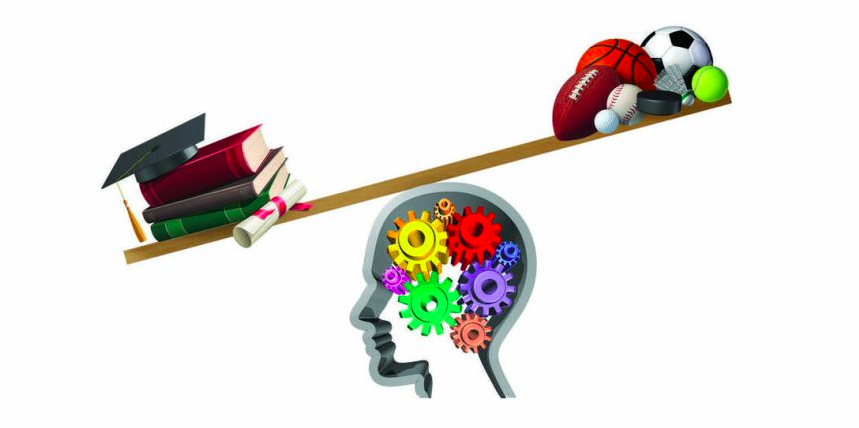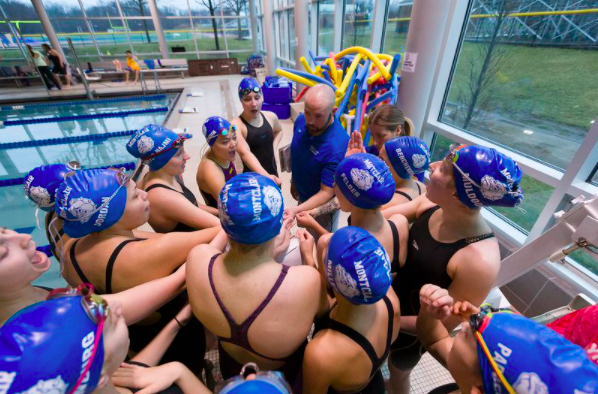Balancing School and Sport: The Double Life of a Student-Athlete
March 24, 2022
Students at Montclair High are no strangers to the extreme stress that comes with school. The pressure from teachers and parents to excel in academics can be really overwhelming and student-athletes are not only expected to perform to the top of their game academically but they are also expected to physically perform well too.
When athletes are in season, the workload from school is higher than ever. Long practice times, far away games, and sometimes playing two games a day makes it very difficult for students to manage their time and complete all work for classes. Coaches and staff consistently say “you are a student first” when it comes to sports, but oftentimes it’s the opposite. Too many times, athletics comes before school and it brings about the question of which is more important, as well as the effect of sports on students’ mental health.
The life of a student-athlete is draining. It begins with some early morning practices (MHS swimming), getting to school on time, going to every class till 2:30, and being dedicated to the sport till seven or eight o’clock. Then the night shift begins, completing all homework and studying, spending time with family, and sleeping, all while attempting to take care of their bodies and minds, the latter of which is often forgotten.
For the athletes whose identity is wrapped up in the sport they play, their self-worth can often become linked to their performance.
When Montclair High student-athletes were asked if their mental health gets put on hold for the sake of their sport, results were mixed. “My mental health is definitely put aside for my sport. Being a student-athlete isn’t for weak-minded individuals, due to coaches telling you your sport is more important than school than just to say school is more important than the sport, it just all takes a mental toll,” Nayanah, a junior on the Cheer team said.
Other students, one of which was Alex Gawler, junior on the Girl’s Crew team, had a different view. “Personally, my sport helps relieve the mental struggles of school. Even though it gives me less time to do work, it holds me accountable for using my limited time more wisely,” she said. “It makes me a more productive student, and I have enough time to get what I need to get done, but not enough time outside my checklist to do other things that I enjoy.”
According to a poll that was open to all student-athletes at MHS, 37.5% of the 16 students who responded are taking more than five AP Courses, in addition to playing one sport or more. Surprisingly, most of the students are handling their rigorous schedules very gracefully.
“I find my sports time to be a good break from school because it requires a lot of focus so I am able to forget about schoolwork for a while and release stress. It does put a big strain on the amount of time I get to do work though. Rowing has definitely taught me to hold myself to a higher standard physically, which has also crossed over into my academics,” said Gawler.
Although for some, the stress of school combined with sports can become overwhelming, it is often a welcome escape for other students from the never-ending academics.
“I don’t think the sports I play interfere with my academics, because it allows me to take my mind off of school after being there for 6 hours,” Ryan Murphy, a junior on the Boy’s Basketball and Lacrosse team said. “There will always be late nights coming home from games and practices, but I make time whether it’s before practice, during study hall or lunch to get my work done.”
Student-athletes have also been seen to be more prepared for real-world situations after high school. A sport is a major commitment and responsibility, which also teaches time management. Skills including teamwork, communication, leadership, multi-tasking, ability to perform under pressure and goal setting are all very valuable. Student-athletes also tend to be more outgoing and assertive which makes them excellent candidates for sales and customer service positions.
Currently, at Montclair High, 42% of students play at least one sport (1,700 students) and 26% of students play 2 sports. Dr. Scarpello, Athletic Director at MHS, conducted a doctorate study based upon the effects of athletics on academic achievement. His findings were that sports have a strong positive impact on academics over every gender and every socioeconomic demographic.
“Between kids who play zero to three sports, the three-sport athletes outperform all others in SAT scores, daily attendance, and discipline rates,” Scarpello said. And in his nine years as an athletic director, Scarpello has seen how student-athletes have mastered time management and the ability to adjust. Scarpello also upholds this idea of “Education-Based Athletics” at Montclair High. He believes life skills are, and should be learned through sports. “For students who play multiple sports, it’s a lifestyle,” Scarpello said.
Despite all of the hardships, every single student who responded to the poll said in their own words that they still very much enjoy the sports that they do participate in.
“Of course. As soon as you stop having fun, and stop enjoying the grind, you don’t have a reason to keep going,” says Catherine Carlson, a junior on the girl’s volleyball team.
The goal for all involved, from the Athletic Director’s office to the coaches, then to every single player is fun. Most students who are involved in athletics are doing it because they truly have a love and passion for the sport they are participating in. And in the midst of a stressful school year, they are still willing to sacrifice their time and energy for something they enjoy doing, and they do it so gracefully.


